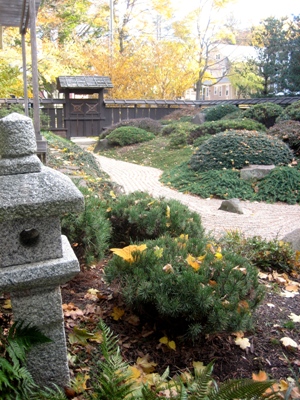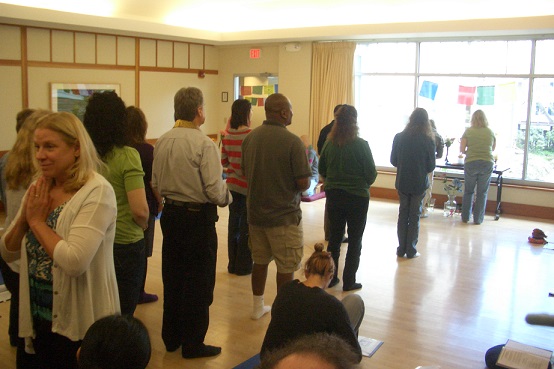Dressing
We recommend that you dress comfortably, causally, and nice. Avoid wearing clothing with harsh and sexual language or violent images. During the summer months, feel free to wear t-shirts, shorts or jeans. Wearing shoes or slippers in the Dharma Hall is prohibited so be sure to wear socks if you wish to keep your feet warm. There is a place to keep your shoes before entering the Dharma Hall.
Arriving Late
The Meditation & Talk meeting starts at 9 a.m. and it is best to arrive before the start of the program. We recommend arriving at least 10 minutes before so you do not feel rushed. However, we understand that things happen in life and you might have to arrive late. We prefer you join us even if you are late. The doors are always open at the Buddhist Faith Fellowship.
Entering or Leaving the Dharma Hall
When entering or leaving the Dharma Hall, members and guests respectfully stop at the door and offer a slight bow with palms together. This graceful gesture shows our respect to the Buddha, Dharma and Sangha, and represents our inner reorientation from the hectic ego-driven life we normally experience to the mindful, peaceful, and compassionate space of the Dharma Hall; the bow shows our readiness to transform our lives. Some who enter the Dharma Hall will also walk to the altar scroll and give a slight bow with palms together to show gratitude to the Buddha of Boundless Compassion within our hearts.
When we leave the Dharma Hall, at the door, once again we turn around and face the Hall and offer a mindful bow with palms together to remind us that we are leaving a sacred space and reentering the mundane world; the environment where we can practice what we have learned during the gathering.
Eating and Drinking
Within the Dharma Hall, we ask you not to eat or drink beverages including coffee. However, you may bring in a bottle of non-carbonated water.Cell Phones
Before entering the Dharma Hall, please turn off your cell phone. During the gathering we strive to maintain a quiet, mindful, and respectful environment.Recording & Filming
Audio recording or filming in the Dharma Hall is prohibited.Hearing the Mindfulness Bell
When the mindfulness bell rings, the etiquette is to stop what you are doing, remain still, and return to the breath. Calmly observe your breath or in your mind recite the Name of the Buddha of Boundless Compassion (Namu Amida Butsu). This practice takes us from the mind of confusion and delusion to the peaceful space of the present moment. Therefore, when you hear the mindfulness bell, do not go for the bottle of water or even peruse through the service book but enjoy being still and tranquil in body and mind.
Bowing
During the gathering the mindfulness bell is sounded numerous times during the liturgy and practice. When we bow, it is not that we are bowing to someone in obedience or even worshiping a deity but we are acknowledging the sacred within, thanksgiving to the Great Compassion, and the acknowledgement of our interconnectedness with all of life. Therefore, we ask participants to follow along with the rest of the congregation.
Unlike some other Buddhist denominations, we do not stand up, bow or even prostrate when a dharma teacher enters the Dharma Hall. Shin teaches that we are all fellow travelers along the path and in the religious sense we are all equals.
Quiet Sitting Meditation
At the Buddhist Faith Fellowship, we offer 20 minutes of quiet sitting meditation (conscious breathing) during our gatherings. In this segment, we do not advocate a specific Buddhist meditation practice, Shin doesn’t emphasize any meditation practice, but instead focuses on deep hearing and the voicing of the nembutsu. However, attendees tend to practice either shikantaza, zen or vispassana styles of Buddhist meditation so feel free to meditate in any form you are most comfortable. Since this is a silent meditation, please refrain from any deep breathing exercises that may disrupt others in the silent Dharma Hall. The main point is to practice calming the mind so you receive insight from the inner light deep within. If you choose to sit on a zafu (cushion), avoid extending your legs forward facing the main altar. In Buddhist culture, it is considered impolite to point your feet at any Buddha or bodhisattva image.
Offering Incense & Touching the Earth
During the Meditation & Talk Meetings, on many occasions, there is a segment in the gathering when members and guests may personally offer incense to the Buddha depicted on the scroll, in Japanese, this is known as Oshoko. It is a voluntary practice; so do not feel forced to participate. One should feel inspired or moved by the Buddha’s call or gratitude to participate.
Participants mindfully walk up to the altar and then either bow slightly or may prostrate on the cushions on floor with palms facing upward. The latter option is called Touching the Earth practice. When we touch the earth deeply, symbolically we connect with all beings, including the Buddha and the planet Earth, and at the same time all beings including the Buddha connect with us. In this act, we understand that we are part of all beings and other beings are part of us. It is a practice of deep reflection on the interconnectedness of life and our place in it.
From here, participants mindfully approach the altar where granular incense is burning. Take a pinch of the incense with either the right or left hand and drop it in the burner. Then, put your palms together (gassho) and you may offer a prayer to loved ones. Then, step back using either your right or left foot and mindfully return to your seat.
Giving a Donation
Like other churches and temples, during the service, members and guests of the Fellowship are given an opportunity to give a financial donation to benefit the various activities of the Fellowship. Without generous donations, we will not be able to provide any activity of sharing the Buddhist teachings. To cover your fair share of the cost to maintain the related expenses for our Sunday morning program, the suggested donation is $10 – $15 per person (cash or check); no one will be turned away for lack of funds. Checks are payable to BFF of CT. Your contribution will be greatly appreciated. Thank you in advance!
Dharma Talk
During our Meditation & Talk meetings, our teacher presents a special talk regarding some aspect of the Buddha’s teachings. During the talk, we suggest you practice Deep Listening, which is the traditionally practice in Japanese temples. Here are the guidelines.
1. You should listen as if you are listening for the very first time.
2. You should listen as if the message is for you alone.
3. You should listen as if this is the last time you will ever do so in your life.
Comments or Questions during Q & A
After the Meditation & Talk presentation, and some times even during the talk, there is usually a time for friends and guests to ask a question or make a comment to deepen understanding. If you choose to participate, please be respectful to other opinions; keep your question or comment short and related to the topic. During the Q & A segment, we are encouraged to practice mindful and gentle speech, therefore please refrain from profanity and harsh words, and current or sectarian politics, otherwise you will be ask to step out of the Dharma Hall.
What makes our religious gathering unique is that there is space in the service for people to ask a serious question in order to grow in faith and understanding, and to offer further insight on a particular topic. Q & A is part of our deep hearing practice that makes the Buddhist Faith Fellowship a great opportunity to listen to other voices and deepen your journey.
Speech Etiquette
Practice kind speech, be courteous and respectful, allow others to speak, and abstain from talking about politics. Remember, we are a Politics Free Zone, where we refrain from current and divisive sectarian politics in order to focus on the Buddha’s transformative teachings. Your clothing must not present political slogans or symbols of any kind, or any other offensive imagery or language, or harsh, sexual or violent imagery. Likewise for online courses and programs, your Zoom profile picture must follow these requirements. Infringement of any of the above rules, will result in either a warning and/or immediate dismissal from the meeting. For more details, please refer to our Code of Conduct policy below.
Code of Conduct
The following Code of Conduct is applicable to all of our activities. In order to create a positive learning and practice environment and community that promote Buddhist values and teachings, participants are expected to engage in kind, courteous, and respectful actions and speech. To clarify, participants should refrain from any physical, verbal and emotional abuse or harassment, possessing, using or being under the influence of alcohol, marijuana or any illegal substance, committing sexual harassment in any form, and harmful, harsh, politically partisan, racist, and demeaning language or acting or speaking divisively to order to disrupt the BFF of CT community, and any and all unlawful actions (which will be reported to the police). We expect all participants to abide by the Buddhist Faith Fellowship’s Code of Conduct, and refrain from any disruptive behavior that inhibits the learning and practice of other participants in our courses, workshops, retreats, programs or activities. Participants who violate our Code of Conduct will be immediately asked to leave the premises, temporarily or permanently, if they fail to adhere to the above Code of Conduct and should understand that any donation will not be refunded.In Conclusion
It may seem a lot to remember but when you are at the Dharma Hall, you can follow the lead of others. If you forget something, do not worry; nobody will look down upon you. Our members and friends are a pretty easy-going crowd. Just be sure to adhere to our common sense Code of Conduct. The main point is to remember that the Dharma Hall is a respectful, mindful, and reverent space. You can consider it as a training space in order to carry and share that atmosphere with others in daily living.

